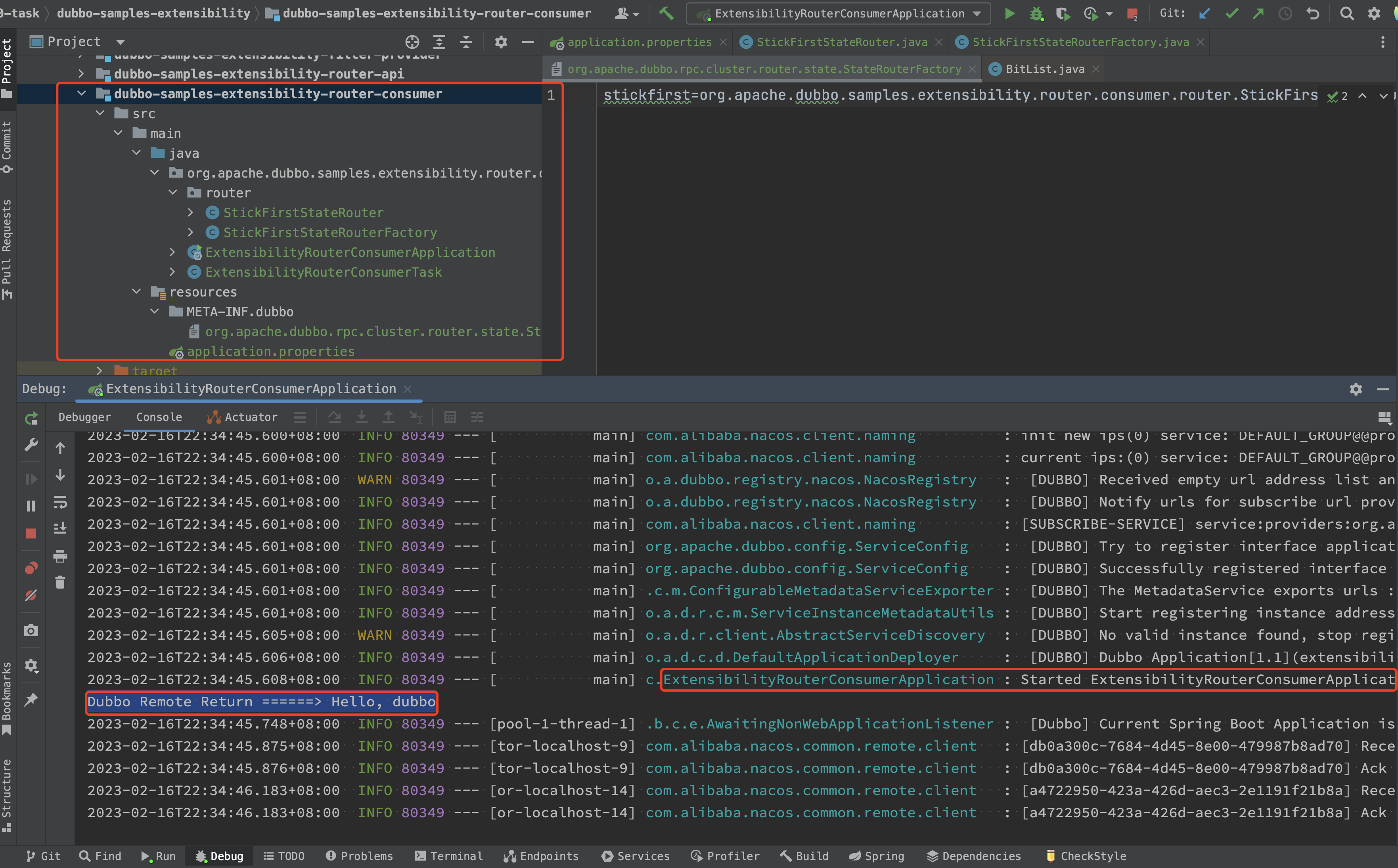路由器
自訂路由策略
透過建立自訂路由器,您可以根據業務場景的特性來實現特定的路由方法。
先決條件
選擇以下兩種部署和運行方法之一
基於 Kubernetes
- 安裝 Kubernetes 環境
- 修改 提供者 中的設定檔,以啟用部署在 Kubernetes 中的 Nacos 地址
# (The configuration remains the same as in the original documentation) - 修改 消費者 中的設定檔,以啟用部署在 Kubernetes 中的 Nacos 地址
# (The configuration remains the same as in the original documentation) - 部署 擴展性路由器任務
使用本地 IDE
- 部署 Nacos 2.2.0 版
- 修改 提供者 中的設定檔,以啟用本地 Nacos 地址
# (The configuration remains the same as in the original documentation) - 修改 消費者 中的設定檔,以啟用本地 Nacos 地址
# (The configuration remains the same as in the original documentation)
任務細節
任務是堅持使用第一個開始提供服務的提供者。如果該提供者離線,則選擇一個新的提供者。
實現方法
在消費者中建立一個自訂路由器。在此路由器中,儲存第一次調用時使用的提供者。對於後續的調用,如果提供者列表包含第一次調用時使用的提供者,則繼續使用它;否則,選擇一個新的提供者。
程式碼結構
src
|-main
|-java
|-org
|-apache
|-dubbo
|-samples
|-extensibility
|-router
|-consumer
|-router
|-StickFirstStateRouter.java (Implement StateRouter interface)
|-StickFirstStateRouterFactory.java (Implement StateRouterFactory interface)
|-resources
|-META-INF
|-application.properties (Dubbo Consumer configuration file)
|-dubbo
|-org.apache.dubbo.rpc.cluster.router.state.StateRouterFactory (Plain text file)
程式碼細節
- StickFirstStateRouter
package org.apache.dubbo.samples.extensibility.router.consumer.router;
import org.apache.dubbo.common.URL;
import org.apache.dubbo.common.config.configcenter.ConfigChangeType;
import org.apache.dubbo.common.config.configcenter.ConfigChangedEvent;
import org.apache.dubbo.common.config.configcenter.ConfigurationListener;
import org.apache.dubbo.common.logger.ErrorTypeAwareLogger;
import org.apache.dubbo.common.logger.LoggerFactory;
import org.apache.dubbo.common.utils.CollectionUtils;
import org.apache.dubbo.common.utils.Holder;
import org.apache.dubbo.rpc.Invocation;
import org.apache.dubbo.rpc.Invoker;
import org.apache.dubbo.rpc.RpcException;
import org.apache.dubbo.rpc.cluster.router.RouterSnapshotNode;
import org.apache.dubbo.rpc.cluster.router.state.AbstractStateRouter;
import org.apache.dubbo.rpc.cluster.router.state.BitList;
public class StickFirstStateRouter<T> extends AbstractStateRouter<T> implements ConfigurationListener {
public StickFirstStateRouter(URL url) {
super(url);
}
public static final String NAME = "STICK_FIRST_ROUTER";
private static final ErrorTypeAwareLogger logger = LoggerFactory.getErrorTypeAwareLogger(StickFirstStateRouter.class);
private volatile BitList<Invoker<T>> firstInvokers;
@Override
protected BitList<Invoker<T>> doRoute(BitList<Invoker<T>> invokers, URL url, Invocation invocation, boolean needToPrintMessage, Holder<RouterSnapshotNode<T>> routerSnapshotNodeHolder, Holder<String> messageHolder) throws RpcException {
if (CollectionUtils.isEmpty(invokers)) {
if (needToPrintMessage) {
messageHolder.set("Directly Return. Reason: Invokers from previous router is empty.");
}
return invokers;
}
BitList<Invoker<T>> copy = invokers.clone();
if (CollectionUtils.isEmpty(copy)) {
this.firstInvokers = new BitList<>(BitList.emptyList());
this.firstInvokers.add(copy.get(0));
} else {
this.firstInvokers = copy.and(invokers);
if(CollectionUtils.isEmpty(this.firstInvokers)){
this.firstInvokers.add(copy.get(0));
}
}
return this.firstInvokers;
}
@Override
public void process(ConfigChangedEvent event) {
if (logger.isDebugEnabled()) {
logger.debug("Notification of tag rule, change type is: " + event.getChangeType() + ", raw rule is:\n " +
event.getContent());
}
// Reset
if (event.getChangeType().equals(ConfigChangeType.DELETED)) {
this.firstInvokers = null;
}
}
@Override
public void stop() {
super.stop();
this.firstInvokers = null;
}
}
- StickFirstStateRouterFactory
package org.apache.dubbo.samples.extensibility.router.consumer.router;
import org.apache.dubbo.common.URL;
import org.apache.dubbo.rpc.cluster.router.state.StateRouter;
import org.apache.dubbo.rpc.cluster.router.state.StateRouterFactory;
public class StickFirstStateRouterFactory implements StateRouterFactory {
@Override
public <T> StateRouter<T> getRouter(Class<T> interfaceClass, URL url) {
return new StickFirstStateRouter<>(url);
}
}
SPI 配置
請在 resources/META-INF/dubbo/org.apache.dubbo.rpc.cluster.router.state.StateRouterFactory 檔案中加入以下設定:
stickfirst=org.apache.dubbo.samples.extensibility.router.consumer.router.StickFirstStateRouterFactory
設定檔
請在 resources/application.properties 檔案中加入以下設定:
# Configure custom router
dubbo.consumer.router=stickfirst
執行結果
使用**透過本機 IDE** 的方法執行任務,結果如下:

總而言之,Dubbo 的擴充性允許您建立自定義路由器,提供根據您的業務需求自定義路由邏輯的方法。本教學示範如何建立「固定使用第一個服務提供者」的路由策略,這對於優化網路流量和減少延遲非常有用。
最後修改日期:2023 年 11 月 1 日:翻譯擴充套件相關文件 (#2844) (e603103c03a)
